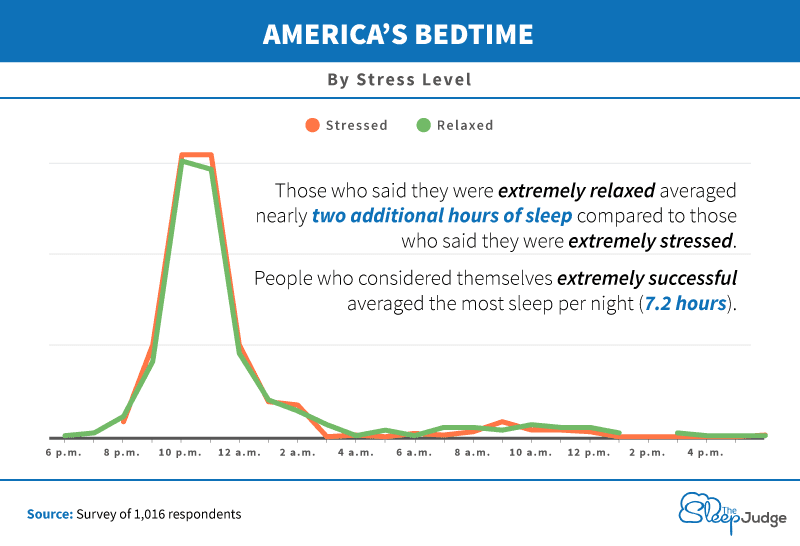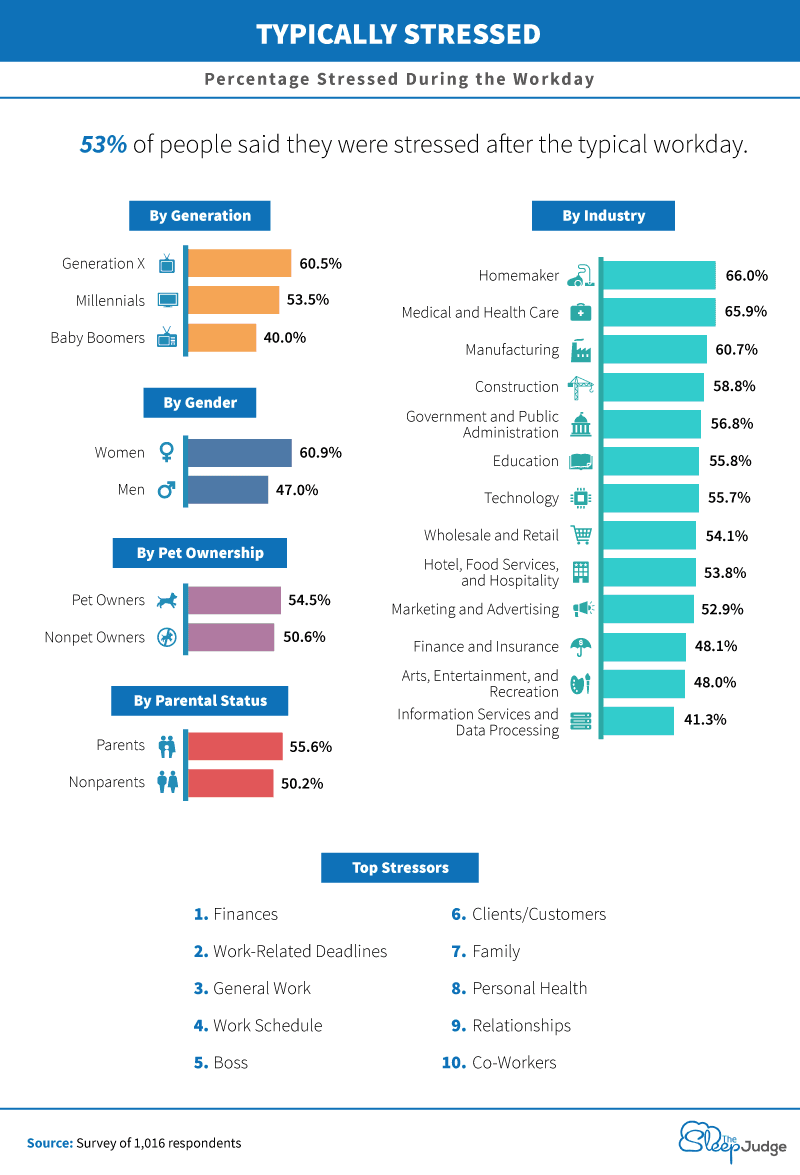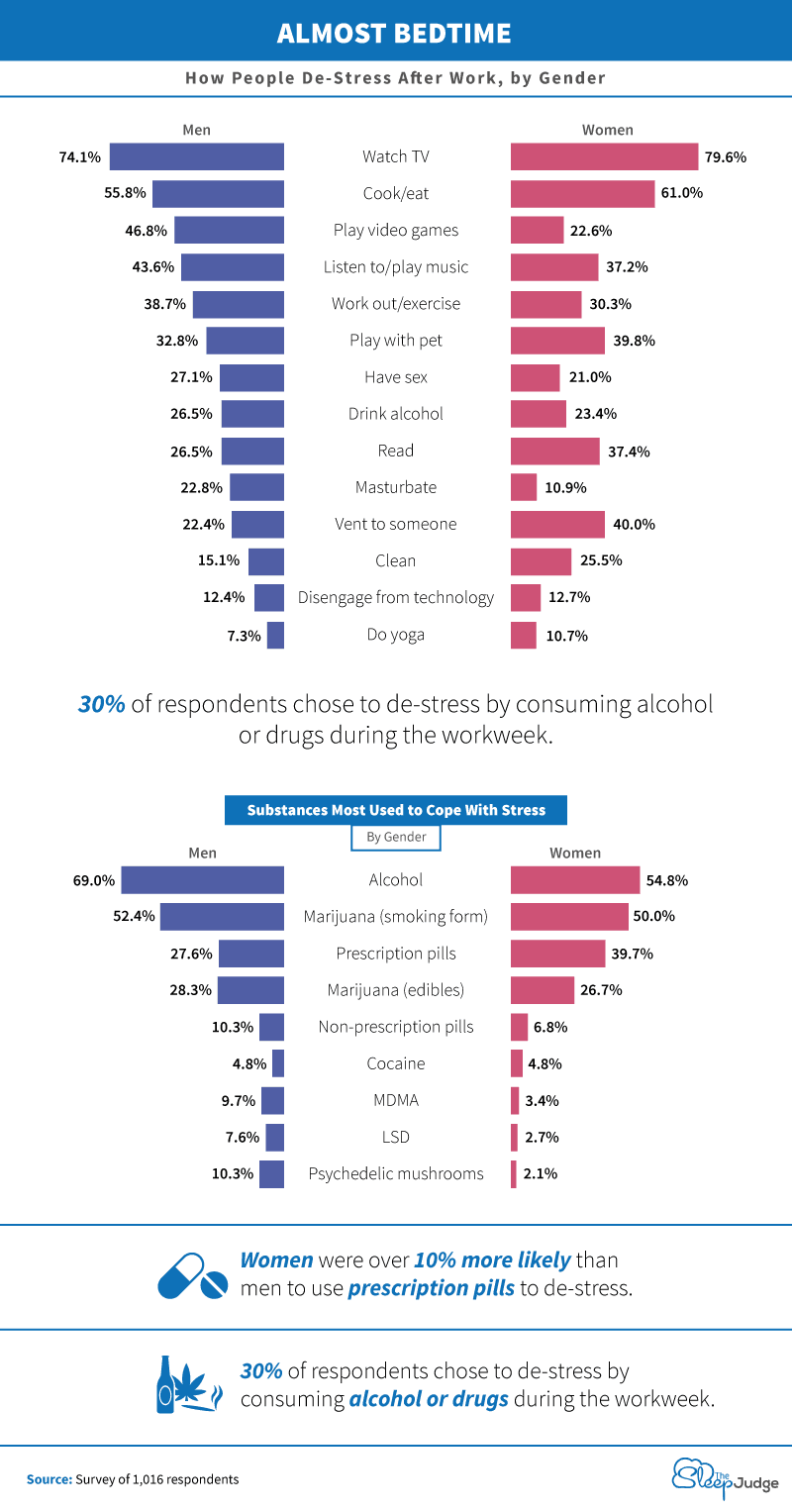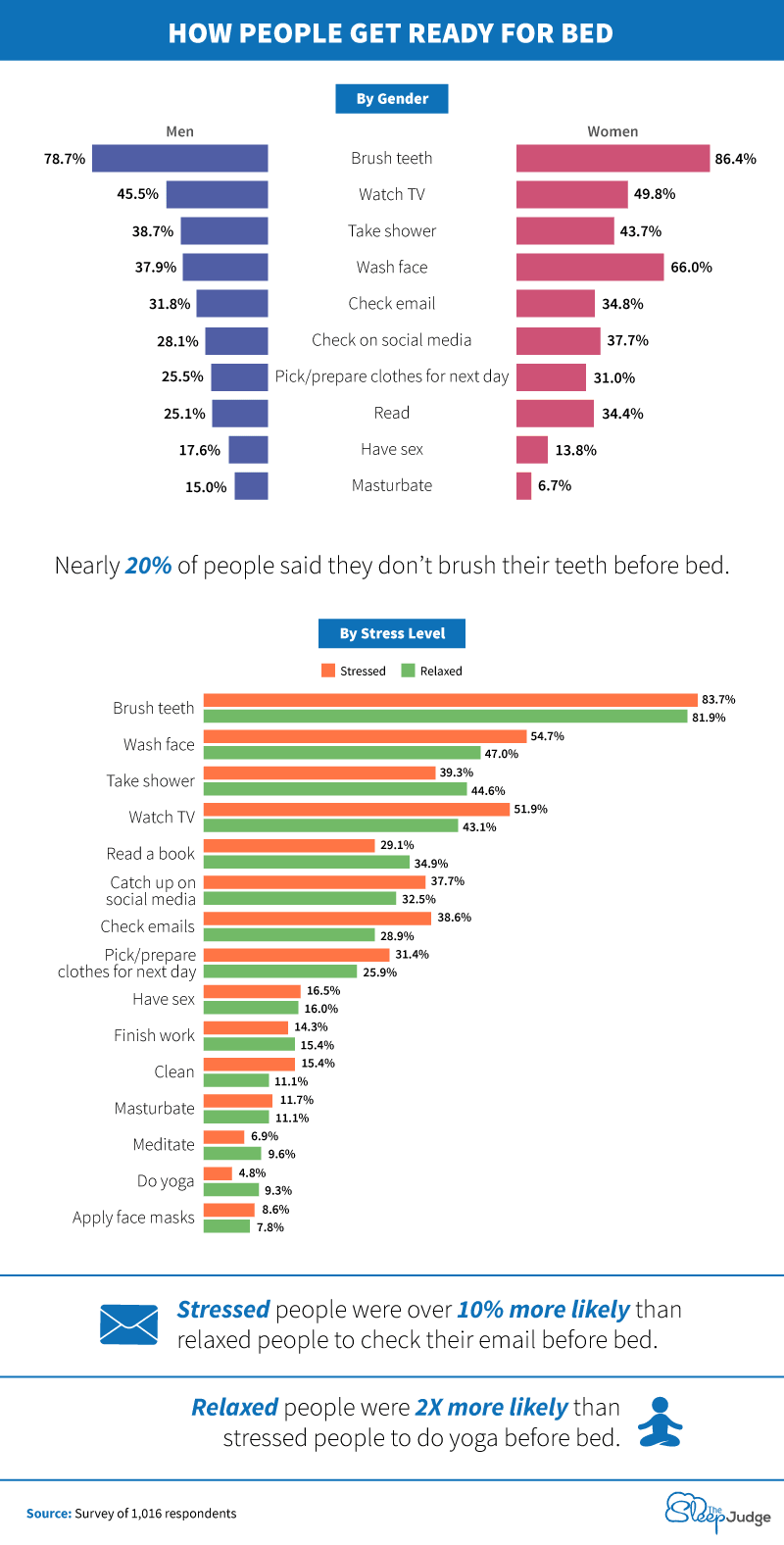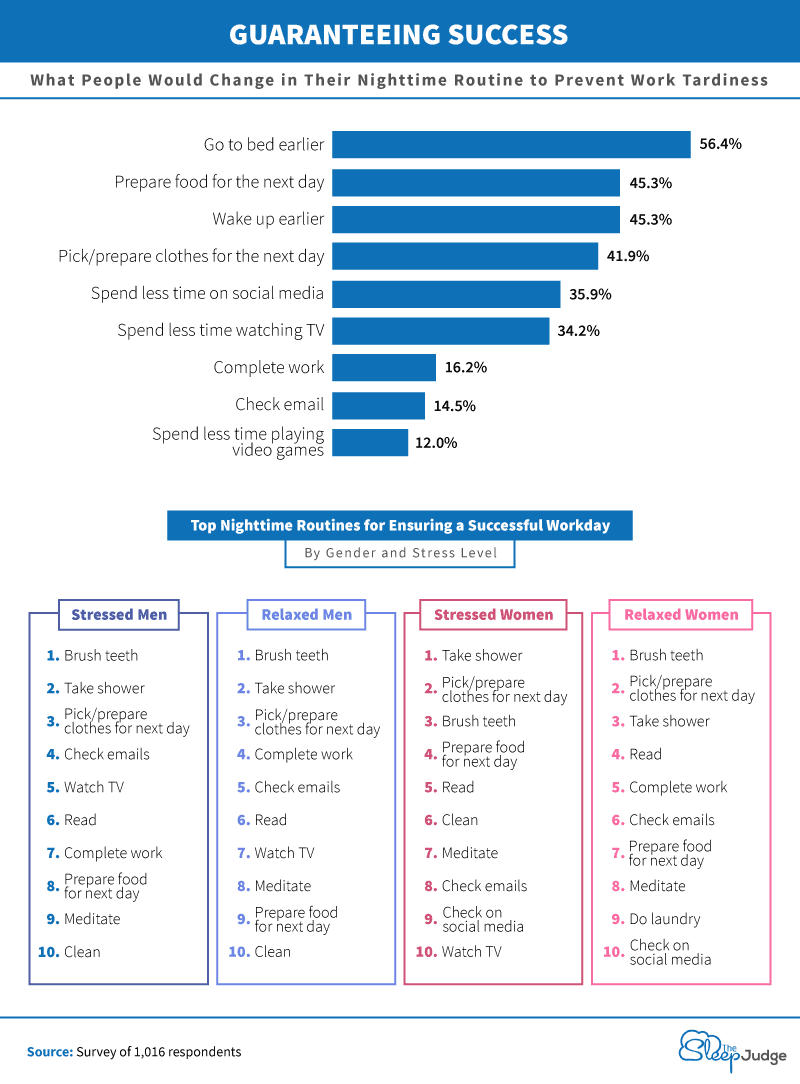Scientists may not have figured out exactly why we sleep, but we know one thing for sure: Sleep is fundamental to our survival. Humans spend 26 years sleeping, and yet, Americans are still not getting enough rest. On average, people spend an extra seven years just attempting to sleep, and a common factor keeping them from doing so is stress.
With most Americans sitting behind a desk for eight hours a day, five days a week, it can be difficult to switch off our work mode, relax our body and mind, and get some decent shut-eye. Despite the difficulty, there are many ways to keep work stress out of our personal lives and, specifically, the bedroom.
What routines decrease people’s stress levels and maximize their zzz’s? We surveyed over 1,000 people about their nightly regimens to see how they de-stress after work and get ready for bed. From sleeping naked and having sex to eating and using substances, keep reading to see how people unwind after the daily grind.
Time for Bed
From the youngest infants to the oldest people, signs of not getting enough sleep are pretty obvious. Most people experience intense fatigue, short tempers, and lack of focus. After consecutive nights of poor or no sleep, mental and physical health can decline, eventually leading to hallucinations and even psychosis.
If adults are supposed to get a minimum of seven hours of sleep, what time are they going to bed? The majority of people hit the hay at 10 p.m., but as stress levels increased, bedtimes got later and hours spent asleep were sacrificed. Those who were stressed were more likely to extend their bedtime to 11 p.m., and as stress levels reached the “extreme” side, people reported sleeping two hours less than their extremely relaxed counterparts.
Workweek Stressors
Stress keeps a third of Americans awake each night, but between work, family, and finances, stress looks different for everyone. Over 50% of people said they were stressed after the typical workday, with women reporting more stress, on average, than any other demographic. Gen Xers weren’t too far behind, though – while 60.9% of women reported feeling stressed after work, 60.5% of Gen Xers did as well.
Looking at stress levels by industry, those working in information services and data processing experienced less stress, while homemakers experienced the most. But stress after work doesn’t necessarily mean the problem is the job. While work-related deadlines, schedules, bosses, and co-workers were significant stressors in people’s lives, the No. 1 stressor was finances.
Unlike a bad day in the office or an annoying comment made by a co-worker, stress stemming from finances isn’t an occasional stressor. In fact, 30% of Americans reported stressing over finances constantly. The worry is likely related to the increasing cost of living and nonmatching salaries. Even if wages increase, inflation and the cost of living leave paychecks in the dust, making it more difficult to live a comfortable life on a pretty decent salary.
Relaxed Routines
As much as we’d like stress to dissipate, cortisol levels take time to return to normal. But as nighttime nears, and hours of possible sleep begin to dwindle, what are people actively doing to decrease their stress in time to get adequate sleep? The majority of both stressed and relaxed respondents turned to TV – a nightly routine for most Americans that experts can’t seem to agree on.
While some argue that technology before bed prevents quality sleep, others think background noise can help people fall asleep faster. The debate remains up in the air, but to be safe, set a self-timer to shut the TV off to avoid any interruptions throughout the night.
Those labeling themselves as relaxed were also more likely to play video games and listen to or play music as a means of de-stressing after work. Those with higher stress levels, on the other hand, were more likely to cook or eat, play with a pet, or vent to someone.
However, some people turn to substances for a physical route to relaxation. Thirty percent of respondents chose to de-stress by consuming alcohol or drugs during the workweek, with men significantly more likely than women to drink to de-stress. Marijuana in its smoking form was another popular substance used to de-stress, with 52.4% of men and 50% of women taking advantage of the relaxing properties of THC.
Steps to Sleep
De-stressing is only one portion of nighttime routines, though. Hygiene was a major part of getting ready for bed, with over 86% of women and 78% of men making sure to brush their teeth before bed. Taking a shower was also common, but both men and women were more likely to watch TV.
They may be onto something, though. Timing and temperature are crucial to making sure a shower before bed puts you to sleep rather than keep you awake. Taking a shower too close to bedtime causes an increase in body temperature, completely throwing off your circadian rhythm and making it harder to catch some zzz’s.
Stress levels also heavily influence nightly routines. Those who considered themselves relaxed were more likely to take a shower, read, meditate, and do yoga before bed, while those who were stressed were more likely to check their email, check social media, and clean. Yoga and meditation are stress relievers, while emails and social media are known to cause stress.
Sharing the Bed
Checking emails and social media at night are obvious stress inducers, but having your phone in bed can prevent you from getting a good night’s rest. Unexpected phone calls, text messages, and lights can shake you from sleep and interrupt quality rest. Still, almost 50% of millennials and 27.5% of Gen Xers slept with their phone.
Routine of Release
While stressed respondents were more likely to believe sex before bed increases sleep quality, research has shown getting it on really does improve sleep. The release of endorphins and oxytocin eases anxiety and increases relaxation, helping people fall asleep faster and stay asleep longer.
Successful Routines
Of course, nighttime routines can impact the quantity and quality of sleep, but not so obvious are the effects nighttime routines have on the following workday. Not getting adequate sleep is likely to result in tardiness, so what can people do to prevent it? The majority thought going to bed earlier would help them not to be late, but for others, preparing food the night before or waking up earlier gave them extra time in the morning.
Routines ensuring a successful workday differ for everyone. For relaxed men, it was all about brushing teeth, taking a shower, and picking out clothes for the next day. For men with increased stress levels, though, checking their email and watching TV were more of a priority. However, for stressed women, taking a shower was a top priority, followed by picking out and preparing clothes for the next day and brushing their teeth. Relaxed women, on the other hand, made brushing their teeth a top priority, more so than taking a shower. Surprisingly, even men and women who were relaxed said checking their email and watching TV ensured a successful workday.
Ensuring Better Sleep
Some things are just not conducive to quality sleep. Increasing stress by looking through emails and checking social media and even taking a shower too close to bedtime can prevent you from falling or staying asleep.
But with sleep being so crucial to health, happiness, and work success, the nighttime routines people form are also important. Straying from technology at night is always a good idea; instead, opening a book, practicing yoga, or having sex are some of the best ways to decrease stress and ensure a good night’s rest.
Methodology
There were 1,016 respondents from Amazon’s Mechanical Turk. The respondents who were excluded missed the attention-check question. Throughout the survey, any outliers were excluded from our data. From the able respondents, 49.9% were women, and 50.1% were men. Our respondents ranged in age from 18 to 76 with a mean of 35 and a standard deviation of 11.49.
Fair Use Statement
How does stress affect your daily routine? If you found this study interesting and would like to share our findings for noncommercial purposes, please do – but don’t go overboard and forget to link back here to provide our team credit for their work.
Sources
https://www.livescience.com/32469-why-do-we-sleep.html
https://www.forbes.com/sites/neilhowe/2017/08/18/america-the-sleep-deprived/#22ba03a71a38
https://www.webmd.com/sleep-disorders/guide/tips-reduce-stress
https://www.thebalancecareers.com/what-is-the-average-hours-per-week-worked-in-the-us-2060631
https://www.verywellmind.com/how-to-relieve-job-stress-after-work-4144874
https://www.cdc.gov/sleep/index.html
https://www.ncbi.nlm.nih.gov/pmc/articles/PMC6048360/
https://www.cdc.gov/sleep/about_sleep/how_much_sleep.html
https://www.webmd.com/sleep-disorders/news/20181220/stress-keeps-1-in-3-americans-up-at-night#1
https://www.cnbc.com/2018/03/19/30-percent-of-americans-are-stressed-out-about-money-constantly.html
https://www.webmd.com/a-to-z-guides/what-is-cortisol#1
https://www.health.com/sleep/falling-asleep-tv-on
https://www.businessinsider.com/right-amount-of-marijuana-to-help-people-relax-2017-6
https://time.com/4665489/hot-shower-before-bed/
https://www.verywellhealth.com/reasons-why-you-should-not-sleep-with-your-cell-phone-4140997

